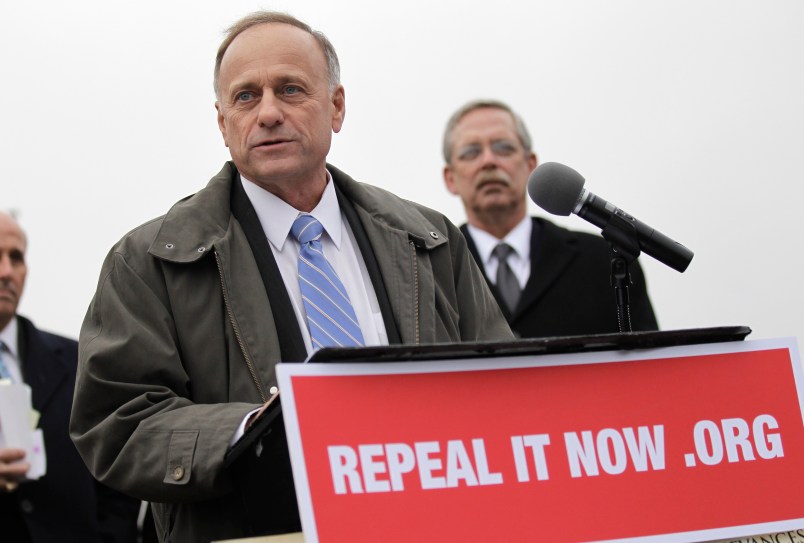Republicans are mulling a change to their health care legislation that stands to transform the types of plans offered on the insurance market, blow up the cost to the government of the GOP legislation and could put comprehensive coverage out of reach for the consumers who need it most.
In a last-dash of deal-making before the bill comes to the floor for a vote, conservatives are pushing for a provision that would dismantle the so-called 10 Essential Health Benefits of the Affordable Care Act. Such a provision could be added within hours of when the bill is voted on, and before the Congressional Budget Office or other outside experts have a chance to analyze its effect.
The Essential Health Benefits stipulate the broad coverage areas plans offered on the individual and small group market must include. The requirements are constructed so that those plans resemble those offered by employers, and include coverage areas like maternity care, prescription drugs, mental health treatment and hospitalization.
The benefits provisions as written in the ACA are considered an important protection for health care consumers to ensure that those who need comprehensive care have access to it. The requirements are supposed to work in tandem with Obamacare’s premium subsidies. The idea was that in exchange for what insurers would gain with the government assisting consumers in buying plans, those consumers would receive coverage that would extend across a variety of health issues. Crucially, the mandated benefits also help create broad risk pools that keep premiums affordable for those who need generous plans.
Though the ACA’s Essential Health Benefits requirement is one of its lesser known provisions, it helps make possible one of the law’s most popular aspects, its ban on discrimination based on pre-existing conditions. Without the EHBs, insurers could craft plans that would be cheap and attractive for young, healthy people because they don’t cover the many areas required by the ACA — areas of coverage young, healthy people might not think they need. This would leave the sicker people — or people who need prescription drug coverage, or who are planning to have a baby — in the risks pools for the more generous, comprehensive plans. As the costs in the risk pools become more concentrated, premiums would rise, and those who needed the coverage most would be priced out or insurers would stop offering them entirely.
Conservatives sought to dismantle EHB requirements because they blamed essential benefits for the rising premiums they would like to bring down with the Republican repeal bill. They argue that Americans should be able to chose exactly the kind of coverage they want, and that in this more efficient system costs to individual would come down. It’s true that by being forced to to cover maternity care or prescription drugs for some, premiums did go up for everybody. As the Huffington Post pointed out, however, leaving out those coverage areas stands to bring premiums down by just a bit, since plans will still likely cover the most expensive coverage areas, like hospitalization or catastrophic care, that were the norm of plans before the ACA was passed.
It’s worth noting the some of the GOP hardliners are also demanding that the Republican ACA repeal legislation tackle its other market reforms, namely those in title I of Obamacare. Those provisions include guaranteed issue for those with pre-existing conditions, the ban on lifetime and annual caps of what costs insurers will cover, and allowing young people to stay on their parents’ plans until they are 26.
Health care policy experts are already cautioning that stripping the Essential Health Benefits requirement — particularly in a rushed fashion, without thinking through how it work other with aspects of the legislation, like the tax credits — risks major disruption of the individual market.
The change also faces procedural obstacles in the Senate, which is why GOP leadership had initially said they weren’t considering repealing the EHBs in the first place. Per the rules of the process of reconciliation, which Republicans are using to avoid a filibuster in the Senate, the provisions in the GOP health care legislation must be budgetary in nature, and have the cumulative effect of decreasing the deficit in the long term.
Democrats, who will get to raise these issues in front of the Senate parliamentarian, are warning that the repeal of the EHBs won’t pass reconciliation rules and could put the whole bill in jeopardy.
There has also been speculation that GOP leadership had feared the effect repealing the Essential Health Benefits would have on the cost of the entire bill. The logic goes that if the requirements are repealed, and insurers are able to offer plans that are vastly skimpier and cheaper than under the current plan, many more people will to be able to use the tax credits Republicans are offering, which are much more meager than the ACA’s. Under the current version of the Republican plan, low income people and older people are unlikely be able to afford health insurance, even with the GOP credits. If premiums were to drop drastically, they would, and government spending on the tax credits would increase drastically, with far more people being able to use the credits.







Friggin’ dolts …
They just need to sweeten the pot …
Maybe insert a provision that prohibits turning bed ridden patients —
More bed sores could put them across the finish line —
They obviously need to come up with some alternative facts in a hurry.
If anyone has not called their Congress critter, it is high time!!
Tell them to vote no!!
Then give it an honest name - The Official Obamacare Kill Bill .
Stop pretending to give a flying f*ck about the American people.
And while at it adopt the new more honest party name: The Mammon Party.
They are looking for that sweetspot between reasonably-priced, comprehensive medical care and the climax of a Saw movie.